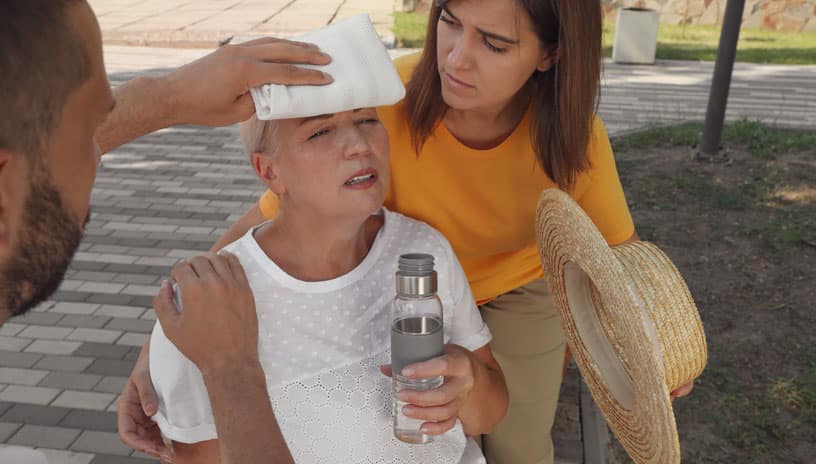Staying Safe in Hot Summer Weather

How to beat the heat and safely enjoy this summer.
The Dangers of High Heat and Humidity
Spending time in the sunshine is good for almost everyone. However, summer weather can prove more than just uncomfortable. High heat and humidity increase our risk of heat-related illnesses such as heat exhaustion and heat stroke.
Why Summer Heat is a Health Risk
The human body normally cools itself by sweating, but during extreme heat, sweating alone isn't enough. When the body can’t cool down properly, its internal temperature rises, leading to an increased risk of heat-related illness. According to the Centers for Disease Control and Prevention (CDC), hundreds of Americans die from heat-related causes each year. Most of these deaths are preventable.
Who is Most at Risk?
Anyone can suffer from heat-related illness, but some individuals face a higher risk:
- Infants and young children.
- Adults 65+.
- People with heart disease, respiratory, or other chronic conditions.
- Athletes and outdoor workers.
- Those without air conditioning or adequate hydration.
Signs of Heat-Related Illness
Watch for these symptoms:
Heat Exhaustion: Heavy sweating, dizziness, weakness, nausea, headache, cool and clammy skin.
Heat Stroke (a medical emergency): High body temperature (103°F or higher), confusion, rapid pulse, hot and dry skin, possible loss of consciousness.
If someone shows signs of heat stroke, call 911 immediately and try to cool them down until help arrives.
Tips to Stay Cool and Safe
Follow these public health recommendations to reduce your risk during extreme heat:
Hydrate Often
Drink plenty of water throughout the day, even if you’re not thirsty. Avoid alcohol, sugary drinks, and caffeine, which can lead to dehydration.
To tell if you're adequately hydrated, pay attention to how you feel and the color of your urine. Signs of adequate hydration typically include clear or pale yellow urine, urinating every few hours, and not feeling thirsty.
Stay in Air-Conditioned Spaces
Spending only a few hours in air conditioning can help your body stay cool. If your home doesn't have AC, consider visiting public places during the hottest hours of the day. Examples include libraries, malls, or community centers.
Dress for the Weather
Wear lightweight, light-colored, and loose-fitting clothing. Wear a wide-brimmed hat. Choose breathable fabrics such as cotton or linen.
Limit Outdoor Activity
Schedule outdoor chores or workouts during the cooler parts of the day—early morning or late evening. Also, take frequent breaks in the shade or indoors to avoid overheating.
Check on Others
Reach out to neighbors, relatives, and friends to make sure they’re staying cool. Make a special effort to check on seniors or those living alone to ensure their safety.
Never Leave Children or Pets in Vehicles
Temperatures inside a car can increase by 20 degrees in just 10 minutes. Leaving a child or pet in a parked vehicle, even with the windows cracked, can prove fatal.
Use Cooling Measures
Cool showers, damp washcloths on the neck or wrists, and fans can all help lower body temperature. Use curtains or blinds to block direct sunlight during the day.
Local Resources Can Help
The Moultrie County Health Department (MCHD) encourages residents to:
- Watch for heat advisories issued by the National Weather Service (news channels, weather radios, and cell phone apps).
- Sign up for local weather alerts, such as CodeRED.
- Visit air-conditioned public places or cooling centers during heat waves.
Cool, Hydrated, and Informed
Extreme summer heat can be dangerous, but with the right preparation and awareness, you can enjoy the season while keeping yourself and your family safe. Remember, heat-related illness is preventable. Stay cool, stay hydrated, and stay informed.
For more information on summer safety, visit the MCHD’s website at www.moultriehealth.org. You can also follow us on Facebook.

